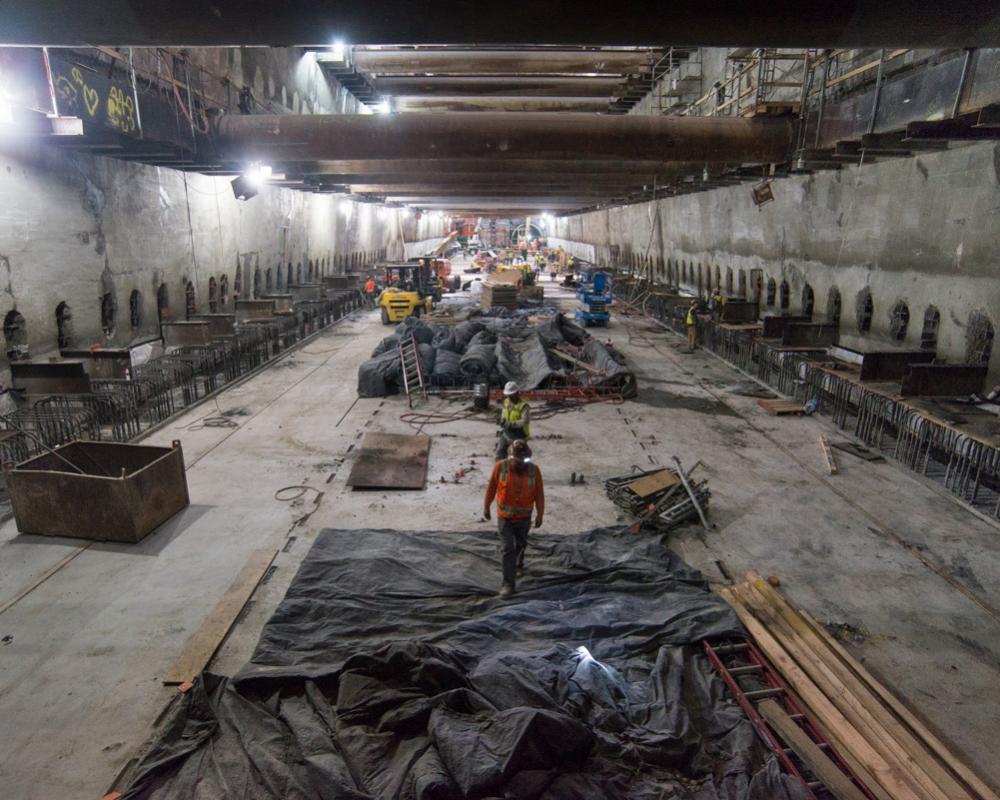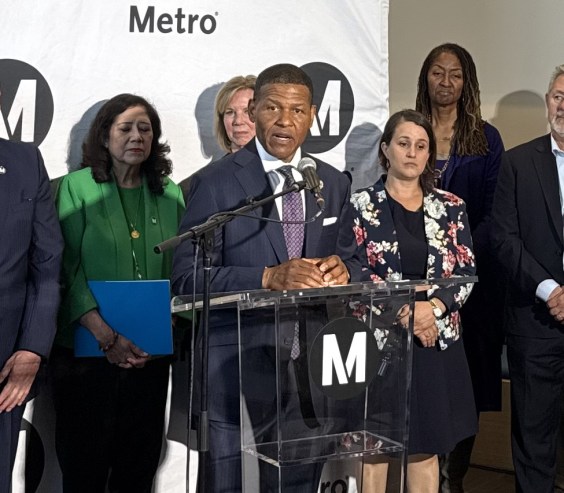Note: GJEL Accident Attorneys regularly sponsors coverage on Streetsblog San Francisco and Streetsblog California. Unless noted in the story, GJEL Accident Attorneys is not consulted for the content or editorial direction of the sponsored content.
California cities celebrated Bike to Work Day yesterday, including Modesto, where a hearty group of riders gathered with Mayor Mayor Ted Brandvold at the crack of dawn under the threat of rain.
But the rain never came--just a short, sweet group ride along the Virginia Corridor, a former rail right-of-way that is now a multi-use trail, to downtown Modesto.
In the plaza in front of City Hall, a Bike to Work Day breakfast was laid out. Breakfast burritos, coffee, bananas, muffins, chocolate chip cookies--it was way more than a rider needed, unless they were coming from miles outside of town. Oakland take note: This gives your annual Bike to Work Day Pancake Breakfast, a long and lovely tradition, some serious competition.
Riders at the downtown plaza also chatted with representatives from local and regional transit agencies, the city of Modesto, the Stanislaus County Bicycle Club, and local planning agencies, all of whom had free stuff--T-shirts, socks, lights, patch kits, even playing cards--for the taking.
Otto Melara and Ben Frazier from Alta Planning stood at a table covered with a map showing Modesto's existing bike routes and lanes. They are working on an update to the city's "Nonmotorized Transportation Plan" (which hopefully will include an updated title). They collected comments and suggestions from everyone who stopped by to look at the map. Riders, and walkers, pointed out particularly difficult spots and talked about ways the city's bike network needs work.
Modesto has a lot of quiet, tree-lined neighborhood streets, which tend to be wide, and with the even wider arterials, fast driving seems to be the norm. That creates a challenge to encouraging people to lessen car use, because people feel unsafe riding a bike next to fast-moving traffic.
Planners in Modesto have been working for years to improve conditions for biking in the city. It already has several lovely cross-town off-road routes, including a winding trail past groves of oak and orchards of almond and walnut along Dry Creek and the Virginia Corridor, the north-south spine of the unfinished network. Several years ago, the city also built a two-way cycle track between the two campuses of Modesto City College, and are working on completing some of the pieces of that bike connection.
They are also slowly and steadily improving connections to the existing off-road network. The most recent addition is a lovely two-way cycle track connecting neighborhoods (and the Amtrak station) in the north over a busy arterial to the winding Dry Creek path. Not only is it protected with cement curbs from fast-moving traffic, it winds behind several bus stop islands and benefits from bike signals and "no turn on red" restrictions at the intersections.
Associate Traffic Engineer Michael Sacuskie says the bicycle improvements were relatively inexpensive, because they were incorporated into a planned repaving of the road, adding only the curbs, paint, and signal heads. They spent about $400,000 on the bicycle improvements, out of a total project cost of $1.5 million.
In addition to updating the Active Transportation Plan, Modesto city planners got state funding through Caltrans' Highway Safety Improvement Program to conduct a Systemic Safety Analysis Report for the city. To that end, a group of planners had spent the previous two days gathering with consultants at several intersections in the city to observe traffic, especially at the tricky morning drop-off times at schools. They discussed challenges and potential solutions to the specific dangers at each spot.
On top of all that, Modesto also has several grants Active Transportation Program grants in the works. They will be used to create better connections in two low-income neighborhoods that have a lot of pedestrians and bicyclists, notably many children trying to get to school, but no bike lanes and few pedestrian crossings.
Modesto, like every California city, has a lot of work ahead to undo years of car-centric planning that helped create the dangerous, wide, unpleasant streets Californians seem to accept as inevitable. The city is making progress on creating safe and pleasant alternative infrastructure, which is the first--huge--step. Bike to Work Day is one way to highlight some of the progress, and encourage more people to take advantage of it.





